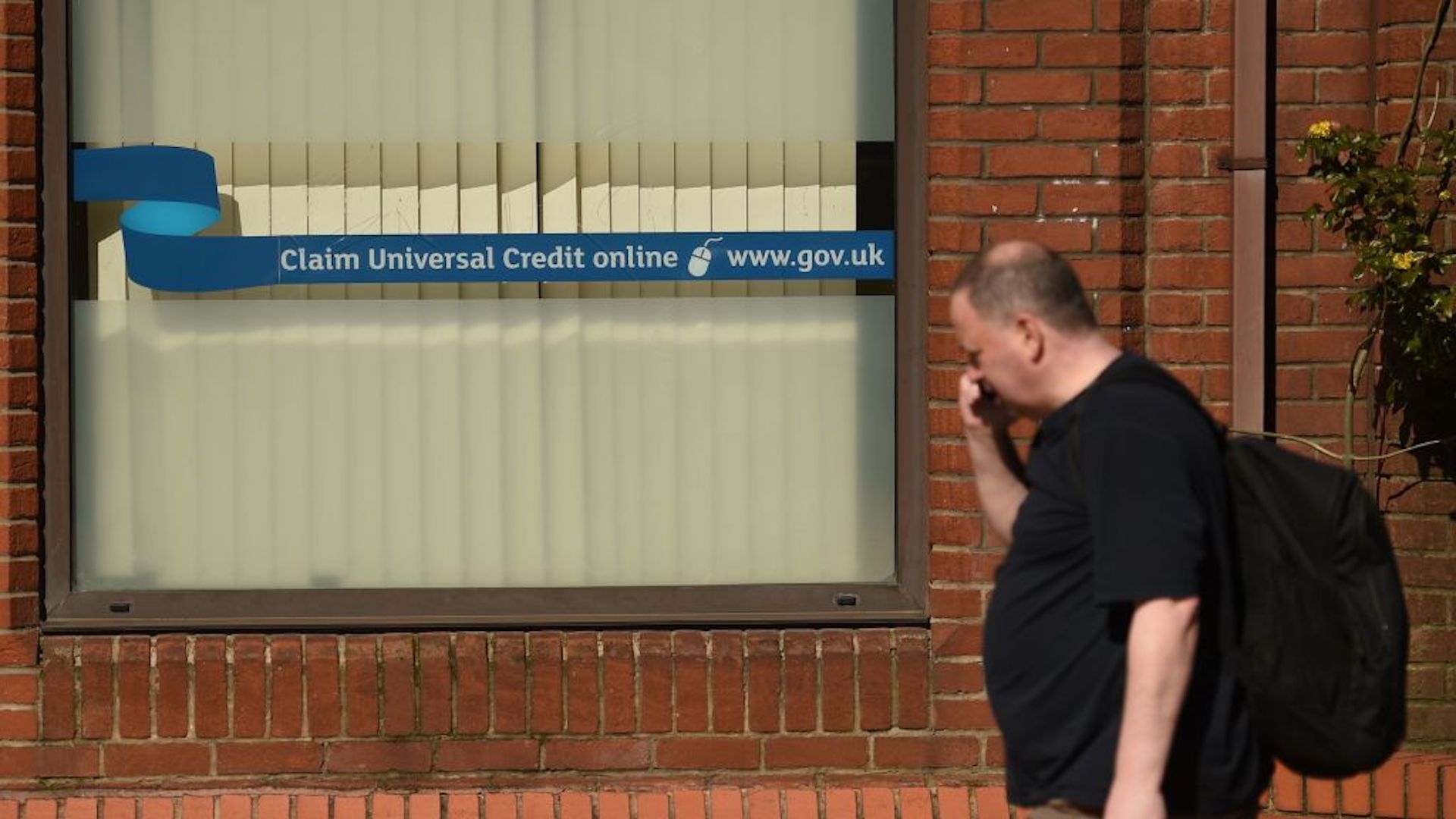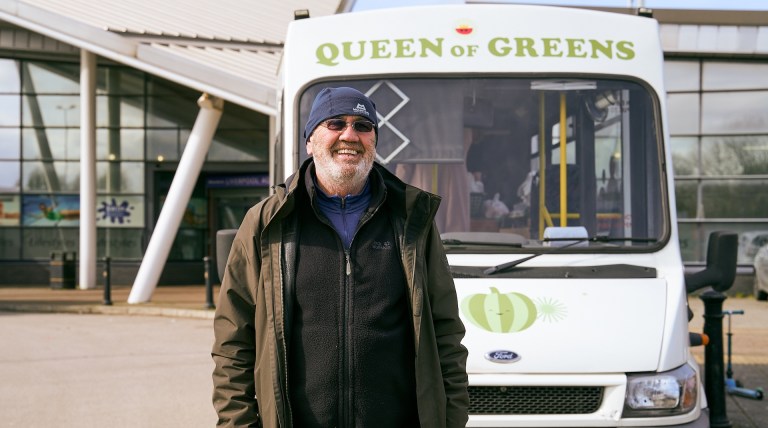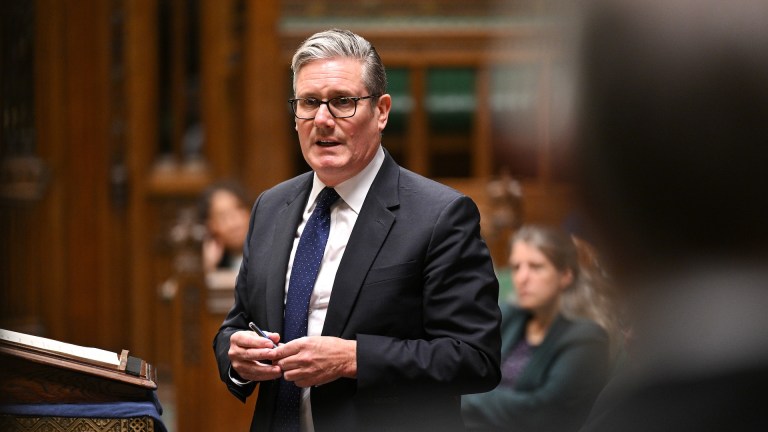The union has warned that the DWP is a “failing organisation in a state of crisis.”
Fran Heathcote, PCS general secretary, said: “The bullying culture at DWP needs to stop. Managers must learn to take mental health concerns seriously and put into place measures to ensure there is adequate support for workers who need it.
“The staffing crisis engulfing DWP is having the most profound effect both on benefit claimants and our members who work there.”
Algernon started working for the DWP in 2020. It followed eight months of unemployment during which he claimed universal credit.
His own work coach recommended he apply for a role at the Jobcentre.
“I went in there very naive in terms of the reality of what the DWP was,” Algernon said. “I was drawn to it because I wanted to help people.”
Advertising helps fund Big Issue’s mission to end poverty
Training was “amazingly positive” but Algernon said: “No amount of training is ever going to be enough. We were warned by a couple of mentors that there is a culture you need to stand up to when you are asked to do things that you know are wrong.”
He was immediately faced with staff shortages and mentoring was limited.
Algernon was put on the team which focused on young benefit claimants aged 18 to 24, around the time that the Kickstart scheme was launched, intended to help young people on universal credit find work.
He worked alongside one colleague, who was also fresh out of training, and Algernon estimates that they were managing between 260 and 270 claims each.
“I said to one of the Jobcentre managers: ‘We can do this for one month before it gets too much. We are completely and utterly rammed. We’re literally just doing the basics.’ I got laughed at. That situation ended up running for two and a half months.”
Algernon added: “You can imagine what it’s like when you’re doing back-to-back appointments.
Advertising helps fund Big Issue’s mission to end poverty
“The second you hit a problem, and you’re having to do any kind of investigation like why a person’s money is wrong, or when a person is potentially suicidal and you have to put them on six-point plan, it is impossible to keep time. There is no place where you can make up that time, other than to cut somebody else’s appointment short.”
He claimed managers were critical of his team for not being able to get through their workload and he was told that he was not referring enough young people to employers through the Kickstart scheme.
Algernon was asked to start calling the young people the day after their appointment to check if they had applied for the job.
One issue was that he had no diary space for that, but he also added: “Why on earth are we now trying to bully and pressure these people into hitting an aspiration? Aspirations were targets. ‘We don’t do targets at the DWP,’ I was told. ‘We have aspirations.’”
Algernon claimed there was a “pressure of never being able to get management to acknowledge the reality of the situation and getting bullied.”
“I felt worthless,” he said. “I felt totally unappreciated. I have never in my life worked a job where there was so much negativity and so much disconnect from the management about what the reality was.”
Advertising helps fund Big Issue’s mission to end poverty
The government is currently rolling out new plans to drive more benefit claimants into work, which charities have said could cause “unnecessary deaths” of vulnerable people.
It will also put further pressure on an already overburdened workforce in the DWP.
Heathcote said: “We believe DWP needs another 30,000 staff just to keep pace with workloads and existing backlogs, let alone implement the new regime the government is driving through. The pressure our members are being put under is untenable and has to stop.
“Unless the department and government accept they must create the environment which will make it easier to recruit, by upping our members’ pay and drastically reducing workloads, this crisis will only deepen.”
More than one in four DWP staff paid are below the real living wage. Nearly all of these will now fall below the national living wage that is due to be introduced in April.
A spokesperson for the DWP said: “The wellbeing of our staff is a priority and we ensure they have access to a comprehensive range of assistance for their physical and mental health, including one-to-one support, putting in place workplace adjustments and advice and counselling services.”
Advertising helps fund Big Issue’s mission to end poverty
Algernon had a mental health breakdown and had to take time off from work. They stopped his pay when he went over his allotted days of sick leave, at around six weeks, and he had to return to support himself.
He was given access to counselling by the DWP, but the core problems were still there, and he felt his managers had not listened to his concerns or those of the psychologist.
The Big Issue has seen exchanges between Algernon and his managers at the DWP showing that they were aware of the toll the work was taking on his mental health. He was facing increased anxiety, panic attacks and depression.
“I ended up getting driven to the point where I had an aborted suicide attempt in the Jobcentre,” he said. “I was back at work because they stopped my pay, not because I was better.”
It was at that point that the DWP did step in and Algernon was allowed to move to another Jobcentre, which he claims he had asked to do previously.
While management was comparatively better at his next Jobcentre, the problems still persisted and workload remained unmanageable, and this ultimately impacted claimants.
Advertising helps fund Big Issue’s mission to end poverty
“I made mistakes,” he admitted. “We had somebody who was a vulnerable young person. They were on universal credit on the basis there was no family and nothing else. I inherited this person.
“This was towards the end and my mental state was so bad and there was such a workload, and basically we were being told to break the rules to achieve what the government was telling us to do. And I didn’t realise for two or three months that this person shouldn’t have even been seeing a work coach. I apologised but I felt terrible.”
His experiences echo those of disability benefits assessors who have previously spoken to The Big Issue.
They described how they were driven to “panic attacks” and “illness” due to the target-driven environment. It led to “mistakes” being made in decision-making.
“We’re punishing these people instead of helping them,” one assessor said. “It just seemed like we’re setting people up to fail.”
Algernon’s only joy at the DWP was working with claimants. He said: “The most common thing I used to find was a lack of confidence, because basically the world had beaten them down.
Advertising helps fund Big Issue’s mission to end poverty
“They had lost their belief in themselves, because they had been thrown about so many times in various situations. That was the biggest thing I could do – if I could get them to start believing in themselves and just get that tiny win, that was amazing.”
But it was “soul-destroying” when mistakes were made by the DWP or he was unable to give a young person the support they needed.
Algernon fears the situation is likely to be worse now, as benefit sanctions were suspended due to the pandemic when he was working at the Jobcentre. There was less of an attitude of punishing benefits claimants than there appears to be now.
“DWP is not doing what they’re supposed to be doing in the way they operate,” Algernon said. “They treat an awful lot of these people with health issues in the same way that, say I found you huddled in the corner crying and rather than talking to you, I decided that I’m going to cheer you up by repeatedly punching you in the face.
“I’ve walked out of there under no illusion as to how claimants ended up getting lost, forgotten about, with wrong decisions and dead. My personal opinion is that two biggest cheats of the system are the DWP itself and the government.”
Get help if you are struggling. Call Samaritans for free on 116 123, email jo@samaritans.org or visit samaritans.org for useful resources and advice on coping. Use Advicelocal to find free, independent advice. Turn2Us advice finder can also help you find local organisations that give advice around benefits.
Advertising helps fund Big Issue’s mission to end poverty
Do you have a story to tell or opinions to share about this? We want to hear from you. Get in touch and tell us more.










